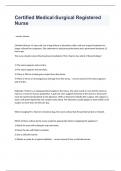Cmsrn pulmonary - Study guides, Class notes & Summaries
Looking for the best study guides, study notes and summaries about Cmsrn pulmonary? On this page you'll find 49 study documents about Cmsrn pulmonary.
Page 2 out of 49 results
Sort by
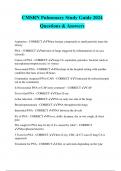
-
CMSRN Pulmonary Study Guide 2024 Questions & Answers
- Exam (elaborations) • 12 pages • 2023
-
- $11.49
- + learn more
CMSRN Pulmonary Study Guide 2024 Questions & Answers Aspiration - CORRECT ️️ When foreign compounds or small particles enter the airway PNA - CORRECT ️️ Infection of lungs triggered by inflammation of air sacs (alveoli) Causes of PNA - CORRECT ️️ Lung CA, aspiration, parasites, bacteria (such as mycoplasma/streptococcus), or viruses Nosocomial PNA - CORRECT ️️ Develops in the hospital setting with another condition that lasts at least 48 hours Community Acquired PNA (CA...
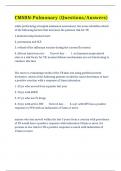
-
CMSRN-Pulmonary (Questions/Answers)
- Exam (elaborations) • 21 pages • 2023
- Available in package deal
-
- $18.99
- + learn more
CMSRN-Pulmonary (Questions/Answers)
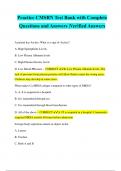
-
Practice CMSRN Test Bank with Complete Questions and Answers |Verified Answers
- Exam (elaborations) • 28 pages • 2023
-
- $12.49
- + learn more
Practice CMSRN Test Bank with Complete Questions and Answers |Verified Answers A patient has Ascites. What is a sign of Ascites? A. High Epinephrine Levels B. Low Plasma Albumin levels C. High Plasma Oncotic levels D. Low Blood PRessure - CORRECT ️️ B. Low Plasma Albumin levels. The lack of pressure from plasma proteins will allow fluid to enter the wrong areas. Cirrhosis may develop in some cases. What makes Ca-MRSA unique compared to other types of MRSA? A. A. It is acquired in a...
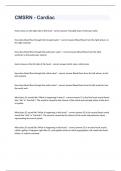
-
CMSRN - Cardiac questions with complete solution 2023
- Exam (elaborations) • 21 pages • 2023
- Available in package deal
-
- $17.99
- + learn more
CMSRN - CardiacHeart valves on the right side of the heart - correct answer Tricuspid Valve, Pulmonary Valve How does blood flow through the tricuspid valve? - correct answer Blood flows from the right atrium, to the right ventricle How does blood flow through the pulmonary valve? - correct answer Blood flows from the right ventricle, to the pulmonary arteries Heart valves on the left side of the heart - correct answer Aortic valve, mitral valve How does blood flow through the mitral...
CMSRN exam 2023 with 100% correct answers CMSRN-Pulmonary exam 2023 with 100% correct answers
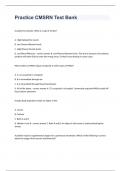
-
Practice CMSRN Test Bank question n answers graded A+ 2023
- Exam (elaborations) • 21 pages • 2023
- Available in package deal
-
- $17.99
- + learn more
Practice CMSRN Test BankA patient has Ascites. What is a sign of Ascites? A. High Epinephrine Levels B. Low Plasma Albumin levels C. High Plasma Oncotic levels D. Low Blood PRessure - correct answer B. Low Plasma Albumin levels. The lack of pressure from plasma proteins will allow fluid to enter the wrong areas. Cirrhosis may develop in some cases. What makes Ca-MRSA unique compared to other types of MRSA? A. A. It is acquired in a hospital B. It is transmitted through sex C. It is...
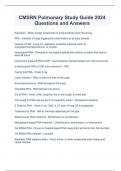
-
CMSRN Pulmonary Study Guide 2024 Questions and Answers
- Exam (elaborations) • 10 pages • 2023
- Available in package deal
-
- $13.49
- + learn more
Aspiration - When foreign compounds or small particles enter the airway PNA - Infection of lungs triggered by inflammation of air sacs (alveoli) Causes of PNA - Lung CA, aspiration, parasites, bacteria (such as mycoplasma/streptococcus), or viruses Nosocomial PNA - Develops in the hospital setting with another condition that lasts at least 48 hours Community Acquired PNA (CAP) - Contracted by infected people out in the community Is Nosocomial PNA or CAP more common? - CAP Test ...
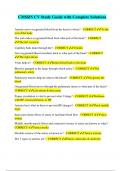
-
CMSRN CV Study Guide with Complete Solutions
- Exam (elaborations) • 15 pages • 2023
- Available in package deal
-
- $11.49
- + learn more
CMSRN CV Study Guide with Complete Solutions Arteries move oxygenated blood from the heart to where? - CORRECT ️️ To the rest of the body The aorta takes oxygenated blood from what part of the heart? - CORRECT ️️ The left ventricle Capillary beds drain through the? - CORRECT ️️ Venules Non oxygenated blood circulates back to what part of the heart? - CORRECT ️️ The right atrium Veins help to? - CORRECT ️️ Return blood back to the heart Blood is pumped to the lungs th...
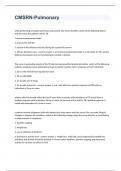
-
CMSRN-Pulmonary question with 100% correct answers
- Exam (elaborations) • 15 pages • 2023
- Available in package deal
-
- $11.49
- + learn more
CMSRN-Pulmonarywhile performing a hospital admission assessment, the nurse identifies which of the following factors that increases the patients risk for TB ocompromised state 2. pneumonia and SLE 3. refusal of the influenza vaccine during the current flu season 4. African American race - correct answer 1. an Immunocompromised state is a risk factor for TB, normal defense mechanisms are not functioning to combat i nfection. The nurse is evaluating results of the TB skin test using purifie...
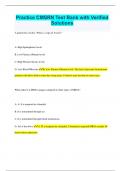
-
Practice CMSRN Test Bank with Verified Solutions
- Exam (elaborations) • 34 pages • 2023
- Available in package deal
-
- $10.99
- + learn more
Practice CMSRN Test Bank with Verified Solutions A patient has Ascites. What is a sign of Ascites? A. High Epinephrine Levels B. Low Plasma Albumin levels C. High Plasma Oncotic levels D. Low Blood PRessure B. Low Plasma Albumin levels. The lack of pressure from plasma proteins will allow fluid to enter the wrong areas. Cirrhosis may develop in some cases. What makes Ca-MRSA unique compared to other types of MRSA? A. A. It is acquired in a hospital B. It is transmitted through sex C. It ...

Study stress? For sellers on Stuvia, these are actually golden times. KA-CHING! Earn from your study resources too and start uploading now. Discover all about earning on Stuvia

